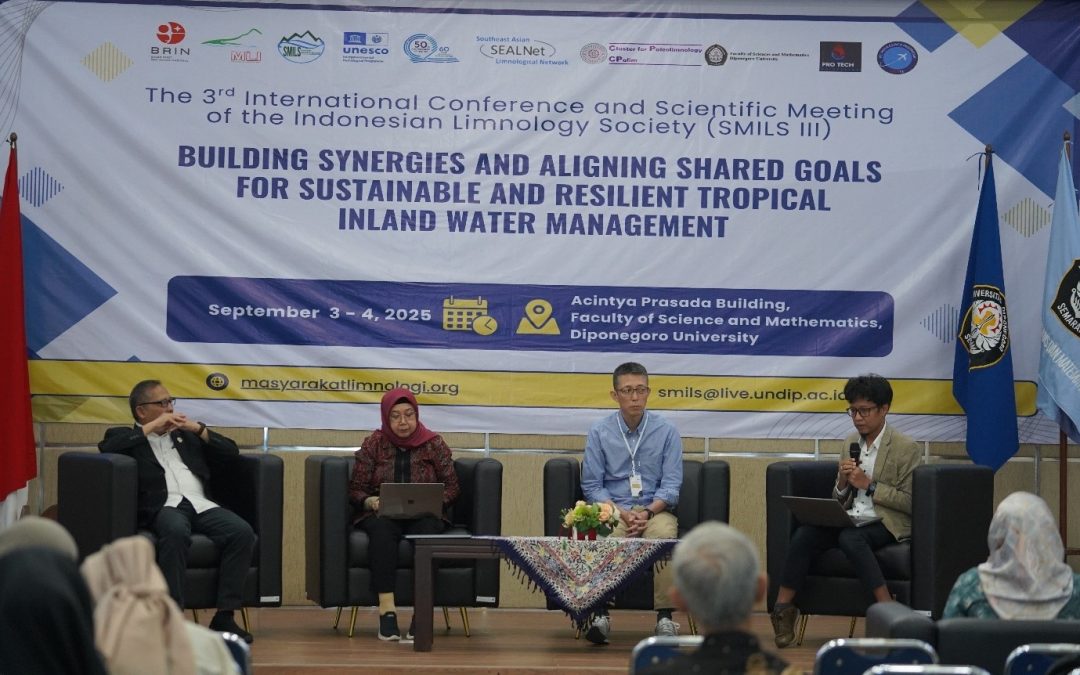The Faculty of Science and Mathematics, Universitas Diponegoro (FSM UNDIP), through the Cluster for Paleolimnology (CPalim), in collaboration with the Indonesian Limnology Society (MLI) and the National Research and Innovation Agency (BRIN), successfully organized The 3rd International Conference and Scientific Meeting of the Indonesian Limnology Society (SMILS III) on 3–4 September 2025. This event was part of the FSM UNDIP World Class University (WCU) program and became an important milestone in strengthening limnology research collaboration at both national and international levels.

Carrying the theme “Building Synergies and Aligning Shared Goals for Sustainable and Resilient Tropical Inland Water Management: Addressing Challenges, Advancing Innovations, and Promoting Collaborative Solutions,” SMILS III presented leading experts from around the world. Among them were Prof. Chihiro Yoshimura (Tokyo Institute of Science, Japan), Prof. Dr. Ir. Gadis Sri Haryani (BRIN), Prof. Dong Gun Kim (Sangmyung University, South Korea), Prof. Peiyu Zhang (Chinese Academy of Sciences), Dr. Budi Heru Santosa (UNESCO–IHP), Prof. Dr. Ocky Karna Rajasa (BRIN), Assoc. Prof. Łukasz Kruszewski (Polish Academy of Sciences), Prof. Tri Retnaningsih Soeprobowati (UNDIP), and Prof. Peter Gell (Federation University, Australia).
This conference was especially significant as it was the first time SMILS was held outside BRIN, with FSM UNDIP serving as the host. This marked the expansion of academic networks as well as recognition of UNDIP’s active role in advancing limnology research and the management of tropical aquatic ecosystems.
Over two days, the event was conducted in a hybrid format at the Acintya Prasada Building, FSM UNDIP. In addition to plenary sessions with keynote speakers, the conference also featured parallel sessions and workshops discussing strategic topics: from paleo-limnology, watershed sedimentation and erosion challenges, aquatic ecosystem dynamics, the use of GIS and remote sensing, to innovations in water resource monitoring.

According to Conference Chair Prof. Dr. Tri Retnaningsih Soeprobowati, SMILS III was attended by more than 100 onsite participants and dozens of online participants from Japan, South Korea, China, Malaysia, the Philippines, the Netherlands, Poland, Australia, as well as various universities and research institutions across Indonesia. FSM UNDIP also involved 45 students in a thematic community service program (KKN) in Bedono Village, Sayung, Demak, which included mangrove planting, the Mageri Segoro program, and eco-tourism development.

The Head of BRIN’s Research Organization for Earth Sciences and Maritime, Prof. Dr. Ocky Karna Rajasa, stated that the collaboration between BRIN and UNDIP, which had been formalized through an MoU, was now being implemented through joint research on water resource management. “In addition, BRIN also contributed 35 papers to this conference and encouraged the development of capacity for master’s and doctoral students through the degree-by-research scheme,” he explained.

Meanwhile, the Chair of MLI BRIN, Dr. Luki Subehi, emphasized the importance of cross-institutional collaboration. “If previously research was more focused within BRIN, now universities, the Serayu Watershed community, and various stakeholders are also involved to find solutions to sedimentation and erosion issues in tropical waters,” he said.

The organization of SMILS III was also supported by UNESCO International Hydrological Programme (IHP), Southeast Asian Limnological Network (SEALNet), and FSM UNDIP. This support from both national and international organizations reaffirmed SMILS as a globally recognized collaborative scientific forum.
With the broad involvement of experts, researchers, students, international organizations, and local communities, SMILS III at FSM UNDIP is expected to serve as a strategic forum to strengthen scientific networks, expand research collaboration, and foster innovations in sustainable tropical aquatic ecosystem management.

